

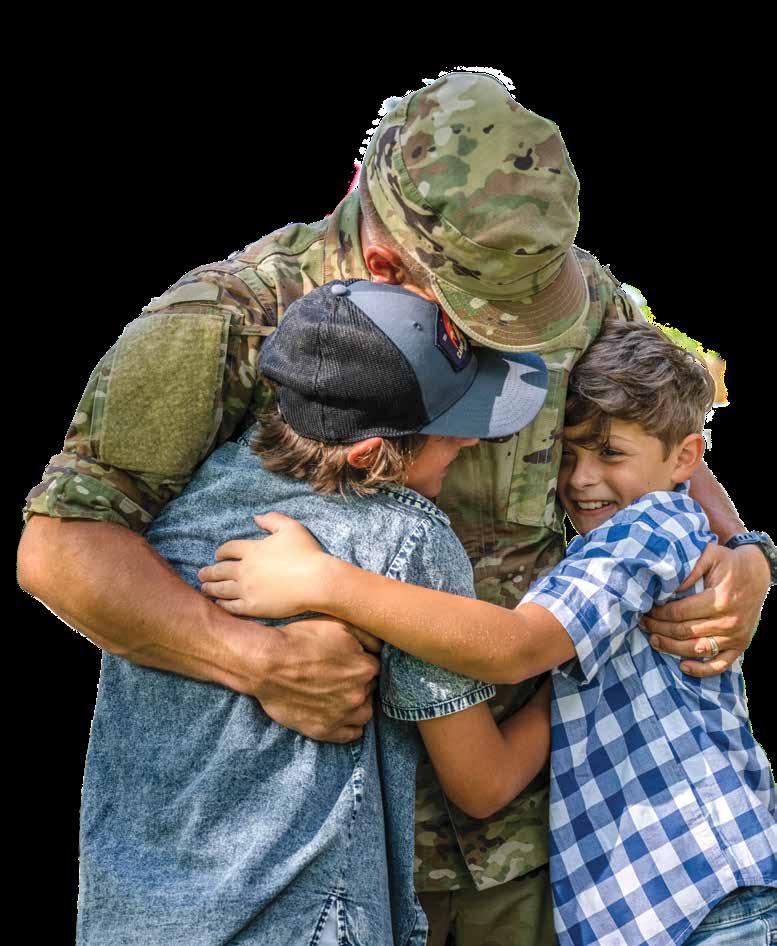




Chris
Brett
Steve
Kristy
Stephen
Toni


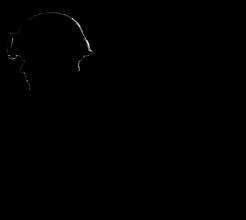
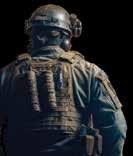

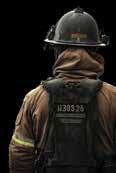










Chris
Brett
Steve
Kristy
Stephen
Toni








April is the ‘Month of the Military Child’. I have the utmost respect for military children. Having been one, I know how challenging the life of a military child can be.
I also know how rewarding it is to grow up with an immense sense of patriotism, gratefulness, and knowledge of the world beyond our borders. I attribute those qualities to my father, our family’s veteran.
My father’s stories have also impacted my life. When I was a pre-teen, I read his book, Without Glory, for the first time. I met the men he served with inside the pages and felt I knew them personally. I also met and remember the man who saved my father’s life, Campbell.
Campbell is gone now. But I will never forget him or what he did for my dad.
These memories and relationships are what make a military family. For us, the military kids, we recognize that our family extends beyond the walls of our home. Our family includes all those experiencing life the way we do, with its beauty and its terror.
Sincerely,
Toni Hedstrom, Managing Editor FireWatch Magazine
In the March 2024 edition of FireWatch Magazine, our story, Remembering the Vietnam War, omitted a crucial word when describing Officer tours of duty in Vietnam.
Correction:
During the Vietnam War, a typical tour of duty was one year for enlisted and sixmonth rotations for officers.



Fear. We all fear losing someone we love. We fear car accidents, “Drive Safe, Honey!” We fear, dare I say, rouge shootings, “Have a Good Day, Honey! Be Safe.” Fear is part of love.
For military and first-responder spouses, the fear is a little more elevated. None of us expect to be killed or injured while working at the office. But for our service members, first responders, and law enforcement, “Full disclosure: you might die” is part of their employment agreement.
Their spouses marry into that awareness. They accept it, and they live with it every day.
Gold Star Spouses Day is a day to recognize those who live with the consequences of that contract. For the life given, the loss reverberates across generations: the mother, the father, the children, and the spouse.
You may not personally know a Gold Star Spouse to honor on this day. That is okay. You can close your eyes and say a brief prayer to thank them for their sacrifice and pray that God gives them strength, comfort, and peace.
California, North Carolina, New Jersey, Washington, New Jersey, Germany, New Jersey, and Texas, all before the third grade.
What does it do to a child’s psyche who has to move almost every year? The nomad lifestyle, at least in this case, did not end with military service. Moving seemed to be in the family’s blood and impossible to shake.
Temple, Belton, College Station, Bryan, Mexia, and Moody, all before freshman year. Military kids’ unique challenges may be unfamiliar to those who have not lived that life. Constantly being the new kid and trying to fit in can negatively impact self-esteem, feelings of acceptance, and the ability to identify with home.
For this military kid, it wasn’t until I left central Texas that I felt like I had a hometown, a home base, or a place where I belonged.
So, if you meet a military kid who has been moved around the world, give them a high-five because that is hard work.
Since 2001, most active-duty military deployed overseas every two or three years. Service Members would be deployed, returned, trained, and deployed again. It’s like a whirlwind, with barely enough time to develop and maintain personal connections with family members.
The impact of deployment on children can stretch across a spectrum from okay to devastating. According to the Department of Defense, nearly one million military children have had at least one parent deploy to either Afghanistan or Iraq.
While deployments may have slowed, the lasting impacts on these kids cannot be ignored. Feelings of anxiety, depression, and disconnection can remain long after the parent(s) return home.
Yes, it’s weird always to be the new kid. But military kids are often the most interesting people in the room, full of stories of adventure, experiences, and cultures most can only imagine.
Many times, these travelers will develop a deep sense of curiosity and appreciation for the diversity of the world that can lead to impactful positions of service in adulthood.

From the castles of Germany to the city streets of Tokyo or the ancient ruins of Italy, these kids have seen much beauty and wonder.
The change in environment can also enforce an ability to be adaptable and flexible in new situations. Military kids learn to adjust quickly to different customs, traditions, and social norms. While overcoming the loss of leaving a good friend behind, they can meet so many more and, with social media, stay connected for years to come.

The future of our world lies in the hands of today’s youth. But it is our responsibility to recognize the qualities within America’s military kids. We can nurture their unique talents and experience and help them grow into future leaders.
Unique opportunities are available through The American Legion to teach Americanism and to promote patriotism in our youth.

American Legion youth programs include community service and safety activities, community betterment programs.
The Service to God and Country program, American Legion Baseball, American Legion’s partnership with Boys and Girl Scouts of America, the Junior Law Cadet Program, The American Legion Junior Shooting Sports, American Legion Boys State and Nation, and the Flag Education Program, are among the many programs available to military kids.
The youth activities programs of The American Legion1 are designed to build physical, mental, and moral alertness in youth; to cultivate in young America strong character, wholesome ideals, and an appreciation for their heritage and freedom, and to develop devotion to civic responsibility.
Resources: Report on the Impact of Deployment of Members of the Armed Forces on Their Dependent Children: www.qrco.de/begOAC
For information about local youth programs they offer, visit American Legion Post 108 online at www.americanlegionpost108.org or contact the by email at commander@ americanlegionpost108.org.
1 Source: Michigan Legion, American Legion Handbook.
USF Health at the University of South Florida in Tampa is conducting a research study on the effect of practicing Brazilian Jiu Jitsu on symptoms of Post Traumatic Stress Disorder in Veterans.


PARTICIPANTS WILL ENGAGE IN 20 SESSION OF JIU JITSU TRAINING AND COMPLETE 3 ROUNDS OF SURVEYS. PARTICIPANTS WILL RECEIVE A $25 GIFT CARD FOR EACH SURVEY ROUND COMPLETED.
POSSIBLE BENEFITS INCLUDE: BETTER SLEEP,
You may be eligible if you are: Veteran or Active Duty (U.S. service member with prior deployment), Male or Female, Aged 18-44, Experiencing symptoms of psychological trauma related to military service, Not in psychological crisis or substance dependent, Able to perform physical activity and Able to read and speak English. THERE IS NO COST TO PARTICIPATE.
The military impacted Jesse’s life. Growing up in southern California, his father, a Vietnam veteran, would often battle with PTSD and experience flashback episodes that were hard for Jesse and his siblings to understand.
In those days, the term PTSD didn’t exist, and the world didn’t really know how to deal with returning troops from the war in Vietnam.
Discussing military service, veterans, and pain was common in the Pratt household. Jesse’s dad earned a Purple Heart and had been medically discharged from service but could not shake the experience.
“He’s always had a passion to serve veterans,” Jesse explains. “That’s been his whole life. As a kid, you don’t know. As you become older, and he is willing to share more stories, you can begin to understand the things you witnessed when you were little.”
After Jesse’s father retired from civil service, he ran a church for a few years from the back of the local VFW near Edward’s Air Force Base. The church, Grace Veteran Church Fellowship, raised thousands of dollars that were given back to the VFW to support local veterans.
“My father’s number one thing was to share God’s word.” This Christian upbringing was instilled in Jesse and guided his decisions throughout his life.
During Jesse’s childhood, his father had taken in a very good friend he had served with in Vietnam. This friend had been terribly injured during the war and

was embraced by the Pratt family as one of their own. This desire to help and care for someone in need was another trait Jesse inherited.

At the age of thirteen, Jesse’s grandfather passed, and a great-uncle he did not know arrived for the funeral. There had been a family riff, Jesse discovered. Uncle Howard had been estranged from his father for many years. Howard was crushed at the realization that he no longer had an opportunity to reconcile with his father.
Uncle Howard and Jesse developed a special bond after that. Howard would return to California to visit many times over the years that followed.
In the 1980s, Uncle Howard developed dementia and could no longer live on his own. Without even a thought, Jesse packed up his life and moved to Florida to care for his uncle.
For years, Jesse prepared meals, did laundry, and managed appointments and medications for his uncle.

One night, as they were driving to dinner, Howard had a stroke. He never recovered, and ultimately, Jesse was forced to decide to let him go as his medical power of attorney. It was a dreadful loss for Jesse, but he held the strength and faith to make it through.
This was Jesse’s service; a sense of duty he inherited from his father, and that of other military veterans, set in him by their example of brotherhood and devotion.




 Jesse and Don Hinst
Jesse and Don Hinst
Tampa Bay is home to thousands of active and retired military families. Because of Tampa’s size, families can choose from many wonderful communities as their new home base. However, the vastness of Tampa Bay makes it easy for new families to feel disconnected, especially the children.
Many families transitioning to MacDill Air Force Base start their home search by identifying the best schools.
Fortunately, MacDill has a fantastic support system through the MacDill AFB School Liaison Program1 under the direction of Venetia Waters. The MacDill Force Support Squadronhosted programs include a list of schools with DOD-funded guidance counselors, monthly support webinars, and more.
Additionally, for those moving into Hillsborough County, there is a District Military Liaison2, Kim Sukach, who can assist parents with navigating school choice options and student support services. Sukach helps parents identify school boundaries, establish residency, and guides those with special needs students in navigating school transition.
Families can connect with the Exceptional Student Education Office3 before arrival to ensure everything is in place. The district liaison also coordinates with Military Family Life Counseling4 to support students’ and families’ mental and relational health as they transition.
There is a new way for families to identify military-friendly schools through the Florida Purple Star School of Distinction5 Program, which recognizes schools that have committed to supporting military families and students.
Support can be demonstrated by recognizing military holidays and days of distinction, such as April as the Month of the Military Child. Purple Star Schools will celebrate Purple Up Day, which falls this year on Wednesday, April 17, 2024.
To earn the “Purple Star” designation, a school must meet specific requirements intended to support the unique needs of military students and families, and make sure teachers understand those requirements. Hillsborough County currently has 21 Purple Star schools. Pasco and Pinellas each have one school with that distinction.
Alie is the wife of a U.S. Navy veteran. She understood there would be moves in her future when she married. Her husband had told her he would “show her the world.”
Six moves and three daughters later, Alie didn’t get to see the whole world, but she saw an awful lot of Florida with three

PCSs to Jacksonville, two to Pensacola, and now Tampa.
It has become second nature to Alie and other military families like hers to experience transition while helping the children acclimate to new schools, friends, and environments.
Alie utilized resources she found on the MacDill AFB Facebook page, directing her to the School Liaison Program and Military Spouse social pages.
“We wanted to be in South Tampa,” Alie says. “It was our first time not being in private schools, so we wanted to find great schools and affordable housing.”
It didn’t take long for Alie and her family to recognize the higher cost of living in South Tampa. Once they realized they would need to look elsewhere, Alie began paying attention to the Military Spouse pages on FaceBook, where her peers were raving about FishHawk in Lithia, Florida.

 By KeishaMarie Douglas
By KeishaMarie Douglas
Chelsea has always dreamed of serving her country. As a girl, she was the youngest of four children, and she remembers vividly how distinguished her older brothers looked when they came home on leave in their uniforms. Chelsea admired her brothers, and she wanted to be like them when she grew up.
When Chelsea turned 18, she signed up to join the U.S. Air Force on the delayed entry program.
Chelsea left home for basic training in San Antonio, Texas, one week after graduating high school. After technical training, she was stationed at Holloman Air Force Base in New Mexico.

One day, she met Matt during her gym time after work, and they instantly hit it off. They worked out together, studied together, and were basically joined at the hip. If you saw one, you saw the other.
They were both smart, young airmen making Senior Airman Below The Zone three months apart from each other. They were great accountability partners who challenged each other to give 100% in everything they strived for.
Eventually, after returning from leave and meeting each other’s parents over a holiday trip, they decided to get married. They married on December 31st, bringing in the new year together, and moved into base housing the following month.
Three months later, Chelsea learned that she was expecting her first child, and she was over the moon excited because her life was working out how she dreamed it would.
However, after a few years, Chelsea and Matt grew apart, ultimately resulting in a divorce and Matt getting stationed overseas, leaving Chelsea as a full-time single mom. Although she has a family care plan, her family is 1,300 miles away on a ranch in Minnesota.
The people in the story are fabricated; however, as a prior supervisor to young Airmen, this story is quite common, sometimes resulting in positive outcomes and sometimes not so positive.


I thought, therefore, after researching stories like this, I would offer some practical advice from other veteran women for those young woman who want to serve the military with a child.
“Never forget to take time for yourself. You can get so absorbed with motherhood and career progression that you forget to care for yourself. Take your time and don’t feel bad about it.”—T., USAF Veteran.
“Keep your integrity at all times because they are watching you. Show them that anything is possible by serving and taking care of them at the same time.”—T.K., USAF Veteran.
“Motherhood was great and challenging in the military at the same time. I met many great people who became my village and literally helped me to raise my children. I am still friends with so many of the people I served with. They are also part of my life and my children’s lives. The difficult part was in the many field exercises and PCS moves (short tours) that necessitated that I be away from them for long periods of time. This ultimately made my decision to separate after almost eight years. I was given an assignment that would have taken me away from my
children once again, and I decided I wanted to raise them myself and not have to send them to relatives. I wanted to be there for all their firsts, and everything else.”—April, USA Veteran.
Your military experience is what you make of it. If it is your passion to serve this country and raise children, it is a challenge, but it is definitely possible. Thank you for your service, sacrifice, and contribution to anyone out there who has done it or is doing it.


A gun trust is essentially a standalone estate plan for firearms and accessories. It contains special language that dictates who can own and possess your firearms after you die.
It clarifies things like the recipient must be 21 years of age, must not have a felony conviction, can’t have had constitutional rights taken away and not restored, etc. The gun trust also protects the weapons from being confiscated by law enforcement or turned over to a TF (Tobacco and Firearms Officer) and destroyed.
Some folks with collections can keep those in the family as an asset. But having the gun trust allows for privacy, especially in Florida, because there’s no registration requirement for certain items in a trust.
In essence, a gun trust enables you to maintain gun ownership privacy. Gun owners don’t have to put their names out there on some inventory list that will be filed with the court system in a probate hearing. It is much like a revocable living trust.
I’ve spoken a lot of people who tell me, “I’m just going to put my guns in my will.”
But, if you have a will in Florida, you’re almost guaranteed probate unless you put other proactive measures in the will. With a gun trust, you designate a trustee.
Say, for example, you go into assisted living or a nursing home. They won’t let you take your guns with you. With a gun trust, they will immediately go to your trustee.
 By Angela Tormey, Attorney at Law ACEMaven Legal
By Angela Tormey, Attorney at Law ACEMaven Legal
You can use your gun trust to designate the sale to other collectors if you want to avoid your weapons going to someone in your family who is underage, convicted of a felony, or who lives in a state where the weapons are illegal.
Let’s say a person passes away and they own ten guns and have three kids. Well, you can’t split ten guns three ways. Somebody’s feelings will get hurt, and then they’re going to court and demanding probate because this isn’t fair.
One of the first things you must do when you enter probate is to submit a list of assets. This means the gun inventory and serial numbers are now a public record. Hell, maybe these guns were bought at a private sale, and you don’t want the government to know about them. Unavoidable in probate, now they are public record.
Another scenario a gun trust can remedy is an executor of a will who has this all under control. He knows Dad wanted little Johnny to have this gun. So, the executor gives it to him. But if Little Johnny takes possession of the firearm and is caught with it, he could potentially have a felony on his record for being underage and in possession of a gun.
So, a gun trust is essentially a set of rules that define exactly what will happen to your weapons after you are gone. The guns are now registered within the trust and managed by a successor—a trustee—that you establish in advance of your passing.












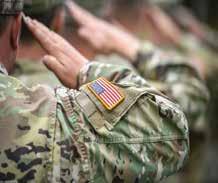
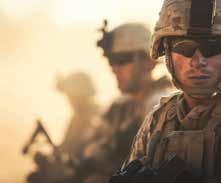

Patti Templeton, Founder and Executive Director of One Community Now in New Port Richey, Florida, sat down with FireWatch Magazine to share the foundation’s origin story.
Our attention has been brought to One Community Now for how they help veterans. We learn that it’s not only veterans they help. If you are in need, someone at One Community Now wants to listen to your story and help you find a solution.
Veterans now have their own place, the somewhat new Veterans Support Center located at 4620 Professional Loop in New Port Richey. One Community Now is a faith-based organization, and the story behind how the Professional Loop location came to be proves that prayers are answered.
Patti had worked at a church for nearly 17 years and had been part of setting up an outreach ministry there. At the time, the Pastor had been a missionary for over 30 years and focused on global outreach. Patti, who was from Detroit, Michigan, had experienced poverty in her home state. She knew full well the struggle was also very real here in central Florida.
“I had a heart for local outreach,” says Patti. “The two of us got together to form One Community Now as a separate 501(c) (3) from the church, and he believed in me; he really inspired leadership in me,” she recalls of her then pastor.
Initially, there weren’t any employees at the new non-profit organization, but by 2018, two had been hired as missionaries moving into neighborhoods to reach the community. The project began as the Pack-A-Sack Program.
Change was forced on efforts when a new pastor took over at the church and decided to close the outreach program, firing all staff. Patti knows God was in control because the current location of One Community Now, located on Main Street in New Port Richey, had initially been another non-profit organization that decided to close operations amid the COVID-19 epidemic of 2020.
The struggling organization approached Patti and asked her to become the new director of the non-profit. They told her she could change the name and do whatever she wanted with it. They only asked that she continue helping people with employment needs.
Patti quickly embraced the opportunity and opened One Community Now as a local outreach.
When One Community Now opened, Patti had already been
part of one Stand Down event and was still doing the Pack-A-Sack Program in nearby neighborhoods. The new organization made acquiring funding for the program more accessible and allowed Patti and her team to begin helping the homeless with housing and other needs.

Patti and her church outreach program had the first Stand Down event in 2011. The group had learned the initial model of a Stand Down from a veteran who had lived in San Diego, California, where a Stand Down outreach event had been held for Vietnam Veterans.
At the time, the church’s outreach program had about 12 committed to utilizing the San Diego model here in Florida. The group researched and learned how to hold a Stand Down event. For the first couple of years, it was only a one-day event. Eventually, it became a two-day event and, later, three.
The San Diego team had always held their Stand Downs at fairgrounds or baseball fields. The team approached park managers at the Veterans Memorial Park in Hudson, and together, they worked with the County to use the city park.
“The County actually did a Declaration of Stand Down Day,” says Patti.
“The Stand Down events used to be held in the Fall, but we were always dodging hurricanes and bad weather. We would have these large military tents set up for homeless veterans to rest for the night, and they would be in constant danger of blowing away,” says Patti.
Eventually, the team scouted and found the Concourse Pavilion, which had a stationary 10,000-square-foot covered pavilion that would work well for the event. But they still had to devise a way to manage the overnight portion of the event without the tents.
They were able to use the Fasano Center for a couple of years and later began utilizing local school gymnasiums for overnight use.
“This worked out well because the attendees could use the showers and other amenities. We held yoga there, breakout sessions, and even had people come in to cut hair,” says Patti.
“Everyone attending the event overnight gets to the gymnasium at about 6:00 pm. They are provided breakfast and transported back to the Stand Down pavilion the next morning. We staff the gymnasium with overnight room and shower monitors, and we have Chaplains there the entire time, so if someone can’t sleep, they have someone to sit and talk to.”
One Community Now spearheads the annual Stand Down
outreach event in Pasco County each year.
“We have a lot of connections that allow us to utilize everyone in the community,” Patti says.
Veteran’s Court
“On the Friday of the event, we have Veteran’s Court,” Patti explains. “There is a judge on site and people from the public defender’s office and the prosecutor’s office who work together on veteran cases needing fines or fees dismissed to get back their licenses.”
Florida Southern Baptist Convention Dental Program & Mission Smiles
“Florida Southern Baptist bring down a bus full of equipment to provide free dental work. We also work with Mission Smiles, which sets up a tent in the hygiene area.”
“Veterans can have their teeth cleaned, pulled, cavities filled. Last year, veterans received free dentures! At least 20 veterans received new dentures last year. Now, we have a waiting list for dentures,” Patti says.
Plethora of resources
“We have people on-site to assist with housing, employment, education, mental health, and physical health. Last year, we had acupuncture and yoga. Social work students from St. Leo’s University set up the R&R tent with couches and games. It’s a place to come, sit and relax, and play cards and dominoes. There is an arts & crafts area, a chaplain’s tent, and a donations tent where veterans can get shoes and clothes, hygiene products, and other essentials,” says Patti.
“Food and drinks, as well as workshops, trivia, bingo, dancing, and much more, are always available. With over 50 vendors participating, we make it the most all-encompassing three-day event for veterans as possible.”
For the first couple of years, there were about 150 veterans who attended the Stand Down events. Participation has increased to more than 350, with 80 percent of attendees being veterans. Word is spread throughout the tricounty area about the event at Veteran Service Centers, food banks, soup
kitchens, libraries, and anywhere else veterans might be. Busses are dispatched all over to provide transportation to the event. There are yard signs, flyers, and car magnets. One Community Now uses every possible resource to spread the word.
“This is a service for veterans, so the event has a strict entry policy. We want veterans to feel like this is their event. Everything that is being given out is to honor veterans,” explains Patti.
When asked if the Stand Down event makes a difference on the One Community Now website, the answer is a resounding “Yes!”
“Over the past seven years, we have been able to work with over 1,000 struggling veterans and their family members to connect them to services and resources,” says Patti.
This year’s Operation Stand Down will be held April 19-20, 2024.


Are firearms really dangerous? Firearms in and of themselves are as safe as a spoon sitting on the counter. A spoon will not jump off the counter, dig up a scoop of ice cream, and shove it down your throat.
A firearm is very similar. It will never jump up and shoot






1. Muzzle Awareness: Only point the weapon in a safe direction—NEVER at a person—unless you intend to harm them. This one is critical because even if you touch the trigger and it goes off, it can’t hurt someone if it’s not pointed at them. I practice this every time I touch a firearm.
2. Treat every firearm as if it’s loaded: You can NEVER assume it is empty or safe. I run a retail store, and all my staff are trained to clear every firearm before they hand it to a customer and again when the customer hands it back.
3. Trigger safety: This one is the simplest exercise but the hardest for people to do. Remember when you were a kid, and you made a “gun” with your hand? You pointed your index finger towards your foe and closed the rest of your hand like a fist. Practice that same form whenever you touch a firearm to avoid an accident. It takes the trigger being pulled rearward for the gun to fire. There are very few exceptions to this rule. So, practice this one simple step, and you’ll have a long, happy life of firearm enjoyment.




4. Buy a safe: Aside from the obvious reasons, such as kids, burglars, or people seeing your collection, a good safe will keep your weapons secure in the event of a fire. After spending thousands of dollars on your collection, the last thing you want to see is your collection going up in smoke. Fingerprint technology is great for quick access, and the firearm can be secured in the safe fully loaded.
5. Other safety options: You can keep the weapons unloaded or install trigger locks. There are literally hundreds of safety options.
Remember, firearm safety is our responsibility, so when you see the news blame the firearm, always remember, it’s the person using the firearm that is causing the harm.
EDITOR’S NOTE: Chris “Ranger” Gay is the owner of 2nd Amendment Armory in Brandon, Florida.





“Our Mission is to destroy one 750-pound general-purpose bomb located at 72362,” Billings says.
“Execution of task as follows: Demo team, blow the bomb in place with comp C-4 explosives and electrical time fuse. Security element, provide perimeter defense at bomb site. Also, provide point and frontal security in movement and danger areas. Primary route is red, alternate route is blue.”
I draw lines followed by the letter “R” for our primary route and “B” for the way we’ll go if we run into problems.
Billings continues with the mission briefing and identifies the mission’s call signs, which DJ writes down on a card he’ll tape to his radio’s handset.
“Gentlemen, stay on your toes out there. Let’s all come home alive.” Billings slides his notepad into his pocket. “Saddle-up, we depart in one hour.”
The Padro choppers land one behind the other in a large clearing. The jungle lies to the west of the landing zone.
As I sprint out the back of the Padro, I get a deceptive impression of the elephant grass. The chopper’s backwash has forced the elephant grass nearly flat. When the helicopters lift upward, the grass springs back in place with its sharp teeth. I see only the upper portion of the team member’s bodies in the five-foot-high pasture.
The razor-sharp weed tears at my skin, slicing long gashes into the flesh. Blood trickles from several lacerations, and the stinging goes unnoticed after a while.
The baking sun, producing temperatures of one hundred and thirteen degrees, immediately begins draining my body’s vital fluids. Before long, I’ll start to dehydrate. I don’t
know which is worse, the heat or the relenting rain. But whatever the weather, we have a mission to complete.
BY: KEN SMITSA-Team moves a short distance before entering the triple canopied jungle. The blinding sunlight fades away, turning into semi-darkness. Soaring, black-brown trees support a canopy of multi-colored foliage like hundred-foot pillars inside an ancient temple. Clinging in the lower levels of the canopy, contorted brown vines twist in every direction. Some dangle like limp tentacles from higher branches, and others stand like proud erections.
As we start into the jungle, the security element splits. I take the lead element as point, with Frenchie and Worm behind me. The demo element, made up of Billings, Smitty, DJ, Doc, Stoney, and Gator, follows us. The rear guard is the other half of my security element: Willie, Tex, and Loverboy.
Each man maintains ten feet intervals between himself and the man to his front and rear. Heavily wooded mountains surround the trail we’re following on both sides. Snake-like vines ensnarl the trunks and trees as if trying to strangle them in some silenced death grip. Irregular strands of bamboo stand clumped together like bundles of lime-green poles. The air smells of sweet mold and rotting vegetation. The ground cover consists of incredibly dense undergrowth, which tangles up our feet.
I fear, at times, we’re making too much noise.
The overgrown terrain is ideal for the VC booby traps we’ve come to fear so much. Even with the knowledge that the Koreans passed this way earlier, we know the VC could’ve slipped in behind them and reset or added booby traps.
A fine spray of mist floating ten inches above the jungle floor makes it more difficult to spot them. Sergeant Billings instructs us to keep a watchful eye out for both trip wires and possible ambush sites.
The trip wires would trigger meticulously laid traps designed to bring pain and death rushing down on anyone in their path. The VC, hidden in ambush sites, could blend into the undergrowth, attacking with devastating surprise when they feel they have the advantage.
The jungle is filled with the noise of buzzing insects and

“THE TRIP WIRES WOULD TRIGGER METICULOUSLY LAID TRAPS DESIGNED TO BRING PAIN AND DEATH RUSHING DOWN ON ANYONE IN THEIR PATH.”
chirping birds. People don’t realize how noisy a tropical rainforest is until they enter one and try to be quiet.
The screeching of the tiny, black monkeys high in the trees rings in my ears as I strain to listen for the enemy, for the natural sounds only people make. But I do not hear them.
The slapping and brushing away of the malaria-carrying mosquitoes wishing to feast on my blood and an occasional snap of a broken twig are the only sounds disturbing the hum of nature. The straps on my rucksack dig into my shoulders as the sweat soaks my uniform. Droplets of sweat pour down my back. More drips down the crack of my butt, causing an uncomfortable prickly sensation.
But my main torment is the insects. Like a special effectsridden scene from The Ten Commandments, a thick cloud of hungry mosquitoes returns, swarming over my exposed arms and face. I bat them away with my hand as they dart and dive for me. It’s useless. They want my blood.
A gentle rustling of broad leaves catches my attention. I see a small brown furry animal scurry away. High in the canopy, leaves flutter in the whimpering breeze, reflecting light like a billion tiny mirrors. Splinters of sunlight pierce the world of shadows beneath the jungle canopy. They glow a translucent white as they ricochet off the mist of the jungle floor.
We push on, my gritty eyes moving quickly over the silhouetted mountainous jungle terrain, searching for visual references of the enemy or their hideous traps. Our movements are slow and prudent. Slowed down only by possible enemy danger and the moss-encrusted remains of large fallen trees and hanging vines. The vines have sharp, needlelike thorns that slash and stab at exposed skin on my ears, face, and arms. Occasionally, I stop to remove them.
To Be Continued.
5017 E. Washington St. Tampa, FL 33619
Thursday April 18, 2024
4:30 PM - 6:00 PM






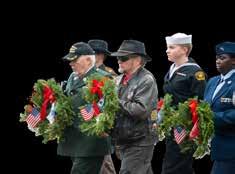
Join #TeamFireWatch for the April FireWatch Live! with our friends from the Tampa Green Beret Association and the quarterly Veteran Benefits Social!
#TeamFireWatch is honored to be a guest at the TGBA Veteran Benefits Social where many of the most dedicated organizations and businesses come to honor and serve the American Veteran. All veterans who attend receive a drink ticket at the door, courtesy of the Tampa Green Beret Association.
Stop by for an exciting evening to explore veteran resources, meet new people, and hang out with old friends.
“We were provided a family liaison via SOCOM. But honestly, we knew so many people who had spent time in Florida that we received the best advice through them.”
In speaking to Alie’s three daughters, it is easy to see that all youth have different experiences and require varying levels of support.
Elena, the oldest and now 23, made the most moves and attended seven schools before graduating from Newsome High School in Lithia, FL.
“I often felt overwhelmed and lost, always trying to fit into a clique before lunch on the first day,” Elena recalls.
She remembers the moment she was welcomed into the school, but it wasn’t by a student. “I remember the golf coach was helping me with my orientation, and he just happened to ask if I had played before,” Elena says. “I told him I had never played, not even once, and he responded with, ‘Perfect! You’re on the team!’”
Elena says that compared to other moves, Tampa was the easiest. “ I knew my sisters and parents were going through the same thing. We were all essentially new kids going at a new school, trying to make friends before lunch on the first day!”
Olivia, now 20, has a very different take on things. “I was extremely upset. It was a huge transition that was made even more difficult by the fact that I went from private to public school.”
She was also entering middle school, which is tough on every kid. “My parents were as supportive as possible, but making friends took a long time.”
It took Olivia until her second year of high school for her to finally feel like Tampa was somewhat of a home.
Gabby, now 16, has had the least moves. She entered fourth grade when they arrived in Tampa.

But Gabby remembers her father’s last deployment. “It was really hard the first few weeks after he left.”
The hardest part was not always getting to share the highlights of the day and special days like a dance recital, her birthday, and just things going on at school. She also noted that when dad was gone, it left a household of only girls and “all the hormones that go along with that.”
“ I had to get along with my mom and sisters. Sometimes, that was a struggle, and I would miss my dad,” Gabby says.
It is never too late to utilize the resources listed above. If you are a military-connected family with children, these programs are here to serve you, as your family has served our nation.
1 https://macdillfss.com/school-liaison-program/
2 https://www.hillsboroughschools.org/Page/6654
3 https://www.hillsboroughschools.org/Page/5129
4 http://tinyurl.com/bddd2ddc
5 http://tinyurl.com/2ph7ttu8



Veteran Voices is a section of FireWatch Magazine that is meant for the Veteran to speak their mind and share what they can with the rest of us. The segment is an effort to understand veterans’ ideas, thoughts, troubles, and successes. Since April is the Month of the Military Child, I thought I would tell you a first-person story about life as a military child. This story is about something other than moving around and the challenges that caused. It’s about growing up with heroes. The biggest hero of my life is my dad, of course, but there were others.

I don’t remember California, the place I was born. My first memories of military life aren’t until kindergarten in Washington State. My dad was in the Army by this time. I remember many of his friends would come to the house to play war games in the garage. They had a large table on an old pool table, and the group would hover over the board, moving troops and ships. The room would be filled with cigarette and cigar smoke. Dad would calmly send me on my way if I attempted to peek into the room.
Later, around the second grade, our family made its way to Germany. We lived off base but would travel onto base for all essentials. I got to know one of Dad’s teammates there. His name was Campbell. I don’t remember his first name; interestingly, neither does my dad. The years have stolen that memory from him. Campbell was a big part of my life. He was a jokester. When we were in the car with him, he would always pretend the brakes had gone out and would yell, “Help, Help me, Mr. Wizard!” I believed in Mr. Wizard, so much so that before one of my dad’s deployments, I insisted we visit the toy store to find Mr. Wizard. We eventually did. Dad claims it took hours of searching up and down the aisles. Mr. Wizard was a monkey, and I knew it when I saw him.

Somewhere around 1978, while on a mission in Africa, Campbell saved my dad’s life. My father was rushed to the hospital with significant injuries. I remember that drive; I remember my mother being worried and scared. I remember seeing my dad in that hospital bed with bandages over his eyes. Things happened so quickly. One day, I was enjoying the life of a second grader, and the next, we were packing up and heading back to the States, where my dad would spend more than a year in Walter Reed Army Hospital. It wasn’t until years later, when I asked my dad, “Whatever happened to Campbell?” that I learned that he had been killed on a mission in South America.
CAMPBELL

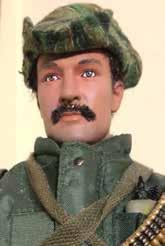
Those injuries were the end of my dad’s military career. He had lost an eye and could no longer serve. We may have been out of the military, but the military was not out of us.
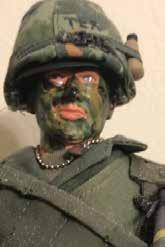
People deal with things in unique ways. My dad always seemed to relive his past through projects. It began with writing his book series, Without Glory, where I learned about Billings, DJ, Doc, Smitty, Gator, Stoney, Clint, Frenchie, Tex, Loverboy, Willie, and Worm. I read about each of their deaths in intimate detail. I learned that many of them saved my dad’s life at least once. What was interesting was that my dad didn’t stop with writing his book. He brought them back to life in the way he knew how. To this day, those men are alive in my dad’s mind and home with the creation of life-size mannequins dressed as he remembers them. The mannequins are the latest iteration of his memories. My favorites are the Ken Dolls my Dad meticulously altered to match the likeness of his friends.
What would I say to these men if I could speak to them?
Thank you, of course. Without most of them, I wouldn’t be here today; without Campbell, there would be no Mr. Wizard.
As for Mr. Wizard, he is alive and well to this day.


 By: Don Hinst
By: Don Hinst
It is our youth who have the most important impact on America’s future. It’s imperative to remain optimistic and encourage these young people to retain ambition and purpose while growing up in a world beset by crises.
Allowing the political environment to stifle their efforts would be a great loss to our nation.
To encourage our youth, we can focus on acknowledging acts of service and kindness. Educators can team up with their local American Legion to honor students with a School Medal nomination, for courage, honor, leadership, patriotism, and service.
This School Medal is the highest honor awarded to youth by the American Legion, and proclaims to the world that this young person is worthy of recognition.
The Whole Child Plan
American Legion members realized that neglect of family/child welfare affected disabled veterans’ rehabilitation. It was the American Legion’s National Child Welfare Division who proposed the “Whole Child” plan. This is a plan of action that contains three main principles:
1. Strengthen the family unit against the forces of a complex society. The American Legion recognizes that the optimal environment for children is at home with his or her own parents. Our efforts have always been directed toward keeping the family together.
2. Extend support to sound organizations and facilities that provide services for children and youth. The American Legion always acts in a supplementary capacity rather than duplicating the efforts of existing agencies.
3. Maintain a well-rounded program that meets the needs of today’s young people. This third principle provides elasticity to address all matters of child health and welfare, and affirms The American Legion’s commitment to all children.
While these three principles are the heart of the “Whole Child” plan, there are four methods acting as the muscle: Education, Legislation, Material Aid and Prevention.
Over the decades, the development of new and improved public programs to provide economic security for children has made it possible for the Legion to focus on other problem areas.
To date, no area of child welfare has gone untouched by the collective hand of The American Legion. The Legion’s program of Children & Youth is unique from any agency, governmental or private, in its ability to expand from every area of concern for child welfare and health.
While The American Legion’s list of accomplishments is long, it is by no means complete.
The American Legion will always seek new, innovative, and better approaches to child welfare programs. We may not know what challenges face our youth tomorrow, but we can offer tools like quality care, education and training to help them prepare today.
The American Legion is proud of everything our members do on behalf of our nation’s youth, along with our extended family: American Legion Auxiliary, Sons of The American Legion and American Legion Riders. Together, our efforts in child welfare are a testament to the Legion’s ability to adapt to changing needs while maintaining high principles and taking on increased responsibilities as necessary.
Trust is such a critical force in the function of any team, a family team, a sports team, a work team, or any team.
Recently, my team read a book by a retired Navy Aviator and Blue Angel, John Foley (call-sign “Gucci”), titled Fearless Success. I want to share a little about what Gucci says about trust.
“I believe that if you increase trust, execution will follow.”
“Trust gives us a clarity of mind that allows us to focus on our energy.”
“High trust contracts are the foundation for communication in high-performing teams.”
He goes on to say that the high level of trust in the Blue Angels is what allowed them to perform such amazing feats.
I have had the misfortune of performing on some lowtrust teams, and the joy of performing on high-trust teams.
Full transparency, I have led both. Since everything rises and falls on leadership, I accept full ownership of both.
With the teams we lead, we should strive to create hightrust environments.
In Fearless Success, Foley presents “The Three C’s of Trust.”
1.) Competence: Are you capable of doing the job you’ve been assigned?
2.) Commitment: Are you 100% committed and engaged?
3.) Consistency: Consistency creates a required predictability.
Foley elaborates with eyeopening insight into trust. I highly recommend you read the book.
Excellence never happens by accident. That is why my team has taken on this book as part of our Martial Arts Professional (MAP) program. Growth habits like this one are how our team excels.
To find out more about

“Gucci’s” book, Fearless Success, and pick up your copy today, visit johnfoleyinc.com/book.

Tony Melchiorre is a senior trusted advisor bringing over 25 years of experience who can help you achieve your business goals.
At AimHigHR, we understand the challenges that come with managing a workforce, and we’re here to help you overcome them. As a leading HR consulting firm, we offer a comprehensive range of services designed to help businesses like yours thrive in today’s fast-paced and ever-changing business environment.
Lifetime member of:

813-955-9248 • tony@aimhighr.biz
aimhighr.biz



We make choices every day, from when we get up until we fall asleep. Many of these are “unconscious” reactions but are still a choice.
How often have you said, “So-and-so made me mad!” blaming your reaction on another person?
Most of us react to situations without really thinking about it. It is easier to blame someone else for your reaction than take responsibility for it.
“It is so-and-so’s fault. He made me mad!”
No, he didn’t. So-and-so may have said or done something that upsets you, but in reality, you reacted unconsciously and made the choice to be mad.
Every time we do that, we give the other person a certain amount of control over ourselves. You may have heard this expression before, but it still holds true: they are now “living rent-free in your head!”
When you get home and tell your spouse about it, they are still in your head. You relay this situation to your co-workers the next day, they’re still in your head. This can impact everything else you are doing. Maybe in a minor way, but it is there.
It does not have to be this way.
We need to realize, what’s happening is simply what’s happening, regardless of what anyone does, or what situation arises, we can always choose how to react to it!
Realizing you control your reactions is a liberating feeling. BEWARE, however! This is a double-edged sword. You can no longer blame someone else while you accept control over your reactions. You must take full responsibility for how you choose to react.
There will be times when you will choose to get mad. While likely not the most advantageous option, this is all right if you accept that this is your choice and not the other person’s fault.
You now have the choice to accept what you have just read or choose to ignore it. Acceptance and implementation will be challenging, but it can change your life. I work on it every day. Some days are better than others. It is a journey.
The point is…the choice is yours.
Disclaimer: I am not a medical professional. I offer advice based solely on my individual experiences, provided as a reference to assist you in your decision-making. Please consult a mental health professional if you feel you are struggling with PTSD, anger management, or any other issues which may be impacting your ability to interact well with others. EDITOR’S
A place like New Port Richey’s Veteran’s Support Center has always been on the wish list for staff and volunteers at One Community Now in New Port Richey.
In 2018, Board Members established a five-year vision plan to determine where all their active programs were going.
The Pack-A-Sack program, veteran’s programs, community center, and the Stand Down events were all in full swing. It was evident that the veteran-focused programs were effective. They really helped connect veterans to people and resources.
“We understood that the lack of connection from resources, and even the VA, were having a negative impact on veteran suicide prevention,” explains Patti Templeton, Executive Director of One Community Now.
Beyond the annual Stand Down event, One Community Now would receive calls from veterans throughout the year. They may have attended the Stand Down but had lost a business card they had been given; they were losing the connections.
“We decided we really wanted to do something to provide a regular, safe place where veterans could go at any time. Our work with area homeless veterans made certain the location would need to have showers and laundry facilities.
“Our dream was to provide a safe place where veterans could come in, build relationships, speak to someone about their challenges, and be matched with area resources. We wanted to be a home base,” says Patti.
In December of 2021, Patti received a call from a real estate agent she had known from church who represented a property owner in New Port Richey who owned several properties and had too many capital gains.
The Agent approached Patti to see if One Community Now would like to take the building as a donation. It was a Godsend. Utilizing Patti’s plethora of community connections, she was able to pull together all of the pieces to make the transfer happen in less than 30 days.
At the start of 2022, the team was busy rehabbing and

sprucing up the property. One Community Now had worked with HPH Hospice Chapters Health, which was entering nursing homes and working with veterans.
“We decided to team up and hold a monthly VALOR CAFÉ at our new location. HPH Hospice brought food and volunteers, and we would have 15 to 20 veterans show up. We would have a speaker who would talk on a specific topic, and then we would break up the veterans into smaller groups with a veteran group leader.
“It became a therapeutic peer-to-peer program. We knew we wanted to do more than the monthly Valor Café, but we didn’t have a lot of funding at the time,” Patti tells us.
In 2024, the center is now open three days a week, with hopes for a fourth day very soon. The Veteran’s Support Center has gained new supporters like BayCare and Aetna, allowing the program to expand and provide more services.
Veteran Steve Petrezino recognized the goodness of the Veteran’s Support Center and agreed to take on a position to oversee operations at the center.


There is value in having a person at the center who is a veteran, who has walked through similar things, and who knows how to navigate the VA system. The center was always meant to be veterans helping veterans. No matter what challenges a veteran comes into the center with, the center can always provide a relationship, someone who will take the time to sit and listen.
“There isn’t always funding available to help a veteran’s need, but it isn’t always funding they need. By listening, we are triggered like, ‘Oh, he needs help with this, and he needs help with that,’” Patti explains. “The relationships we have with either private funding sources or with other organizations allow us to match veterans with resources at a high level.”
Some of the challenges the center can address are major car issues, medical expenses, funeral expenses, education and employment needs, work clothes, and shoes.
The organization covered the cost for veterans to get certifications, get their IDs back, and acquire their birth certificates for employment. Probation fees have been paid, and back taxes have been paid.
“We don’t just throw money at a problem,” says Patti. “We identify what caused the problem in the first place and help, through education, to ensure the veteran doesn’t find themselves in a particular position again.”
 SUPPORT CENTER, FROM PG 27
SUPPORT CENTER, FROM PG 27
I’ve heard many speak of humble beginnings. I didn’t understand adversity would be a part of my life. At first, I was surprised to find out I would go from one reservation to another. How is it said? “Oh, the irony!”
My journey began in April 2001. I had followed my heart to marry a soldier who was taking me to Fort Leonard Wood, Missouri. I had no idea adversity was coming my way. I had to learn to navigate a new environment while leaving the comforts of familiar surroundings, people I love, family support, life-long friends, and a job I was proud of.
Everything I was accustomed to was now a lonesome feeling deep inside. I longed to feel happy, confident, and determined; I just wanted to be me again. Anguished thoughts flooded my mind; I never should have left home! What was I thinking? Did my heart not know I would feel so alone? My confidence and life’s determination were all back there on the Six Nations Indian Reservation, Ontario, Canada.

I sat alone in a rented house on base with no friends or job. The honeymoon was over. Is this going to be my life? My solace came from my calls back home, which unfortunately resulted in skyhigh telephone bills. In his stoic posture and stern voice, my soldier said that I would have to find another way of communicating with my family back home and get my loneliness under control, or we would go broke.
Not long after, I got up early—like “zero-dark-thirty” early—and rode to the base with my soldier. In these early days of our relationship, we had one working vehicle; the other had a broken transmission. Nevertheless, I was determined to find myself a job on this new reservation, and if getting up before the roosters was what I had to do, I was going to do it.
I didn’t yet understand the alphabet soup jargon, but while in conversation, my soldier spoke of three things to me: AFTB, ACS, and the PX.
My saving grace was the Army Community Services (ACS) center. ACS was the hub of information where every soldier and their family could get help maneuvering this new lifestyle. It was there I was introduced to the Army Family Team Building (AFTB) program.
AFTB helped me learn what I needed to be comfortable in my new element; my heart was smiling. I took the training and volunteered, and I’m so happy I did. The new friends I made are still friends, some 21 years later.
This free army training for soldiers and their families was amazing. I was in awe and felt this program should be in every community in America. Who would have thought that just knowing there was a place to access resources would change my life?
From the ACS office, I quickly walked to the Post Exchange (PX) Human Resource office and filled out an application. There, I gained my first employment serving our young Army basic trainees in the shoe department. I admired the youth so determined to be soldiers. They were far from home, their families, and familiar surroundings like me. To this day, these basic trainees hold a special place in my heart.

One young female always comes to mind when I reflect back.
I was volunteering one day at ACS when a young female basic trainee came with her drill sergeant. I could tell she had been crying. Her deep blue eyes were bloodshot and puffy. I saw the teardrops that had dripped onto the collar of her BDUs.
When the sergeant spoke, there was a firm but ever so slight tenderness in his tone as he gave the young trainee an, “At ease,” and then set about requesting information on Army Emergency Relief.
One by one, ACS staff came out from their offices in full force, having heard the sergeant.
Among them was a seasoned spouse of a Chaplain and AFTB volunteer. What I saw that day from those ACS employees and volunteers was heartfelt. They were like family for this young trainee.
The Chaplain’s spouse introduced herself and spoke very tenderly to the young soldier. The young woman never waivered from her stance and answered every question with a, “Yes ma’am,” or “No ma’am.”
The care provided by the ACS staff was like they were wrapping their arms around her, almost to shelter the young trainee in her sorrow. The ACS staff was hopping and popping, giving the sergeant the direction he needed to meet the needs of the young trainee.
I didn’t know much about anything, but it was clear the service that day was intense, immediate, and long-lasting. Assistance was always there for the basic trainees that day and in the days to come.
Later, I learned the young woman had lost her mom in a tragic car accident, and her dad had passed previously of an illness. She had joined the military to help pay the bills at home. She had no siblings and was now alone.
Weeks later, while working at the PX, I witnessed this young female soldier in her dress blues graduation uniform. She stood alone in the checkout aisle while others dressed like her were with their family members and other graduates.
She was clearly not in a celebratory mood like the rest of her classmates. But she had graduated Basic Training, and I was so proud of her that day. I sensed she was walking towards greatness. I could only smile as I watched her walk away confidently and purposefully.
For more information on Army family programs and services:
Army Community Services for families: www.armyfamilywebportal.com
Army Family Team Building: www.armymwr.com/programs-and-services/personal-assistance/army-family-team-building
Army Emergency Relief: www.armyemergencyrelief.org
Army Chaplains: www.army.mil/chaplaincorps



Christmas is quickly approaching and many wonder how to afford a memorable Christmas for their kids. With so many things to be concerned about financially, the pressures of parent performance at Christmas shouldn’t be one of them.
For enlisted ranks whose years in service are at most ten years, the average pay is less than $40,000 per year. The challenges this puts on families have always been recognized but were made even more relevant during the deployments of the Iraq and Afghanistan wars.
During deployments, spouse leadership played an integral part in trying to keep families together through the stress of deployment. Kim Garrett, the wife of an Army Major, recognized two main family stressors: back-to-school and Christmas.
Kim, who served as the Family Assistance Center Manager at the Department of Defense and served within the Georgia National Guard Family Program of the 48th Infantry Brigade, began working on a way to help ease these stressors for deployed soldiers and their families during these two crucial times of the year.
It was a conversation between Mrs. Garrett and Veterans Funeral Care Founder and President Jim Rudolph that ultimately became Operation Toy Soldier.
When Jim was made aware that military kids in this country were not getting presents at Christmas, he made it his mis-
sion. He knew his customers would donate toys, and before he knew it, his mission had spread throughout the country through his funeral director connections, namely Tim and Frankie Stewart with Tim Stewart Funeral Home in Georgia, who ultimately became members of Veterans Funeral Care in 2010.
In the first year of Operation Toy Soldier, Frankie and his team placed 55-gallon drums in his four funeral homes in four different cities. When the drums were filled, he delivered them to Mrs. Garrett, who, with the help of other officers’ wives, distributed the toys to spouses of all service branches.
Operation Toy Soldier has grown to be an incredible movement designed to increase awareness and community involvement. The program has become a nationwide initiative by Veterans Funeral Care to provide toys to the children of deployed and non-deployed soldiers.
The program is here to support children of the fallen as well.
At the beginning of the program, Operation Toy Soldier donation locations were set up for toy donations only. It became relevant that many wanted to donate money instead of actual toys. This led to the creating of a Florida Non-Profit Organization that accepts monetary donations for the purchase of needed toys and supplies for kids.
The program isn’t just for small children. Families with pre-teens can also benefit from gift card donations for the older kids.
With inflation and cost of living increases, the need continues to grow in the Greater Tampa area. Veterans Funeral Services in Clearwater, Florida, has held a live nativity with special guests, Santa and Mrs. Clause, for the past two years to fundraise for Operation Toy Soldier. Visitors are greeted with toys and hot chocolate.
If you are interested in donating to Operation Toy Soldier, you can send a check to: Operation Toy Soldier, P.O. Box 4122, Bay Pines, FL 33744.
To drop off toy donations, please visit OperationToySoldier.com for local and nationwide donation locations.

A rabbi, a priest, and two preachers changed the lives of 230 young men, along with an untold number of their family members, in less time than it takes to drink a cup of coffee.
It’s my hope that you will feel like sharing this story with the young people in your life, so that the next generation will understand the importance and meaning of selfless service and sacrifice.
It is late at night, and you are one of 902 passengers crammed onto an old cruise ship designed to carry 314. The luxury cruise ship is now a troop transport traveling through the rough seas of the Atlantic. It is freezing cold, with icy winds slamming against the hull and the faces of you and your shipmates on board. There is barely room to move about, and most passengers are seasick. Massive ice is weighing down the ship, causing it to move at a snail’s pace of 10 knots.
And it’s World War II.
Today is February 3rd, 1943, and you are on the USAT Dorchester traveling in the sea lanes known for German U-boat attacks on any ship in sight. Word has spread that there was a sighting of an enemy periscope. The captain has ordered everyone to sleep in their clothes and life jackets, but you know of some buddies sleeping below deck in the hot engine room who have disregarded that order.
There are four chaplains onboard the ship. The oldest, Chaplain Fox, is a Methodist minister who is married with two children; he is also a veteran of World War I.
There is Chaplain Goode, who served as a rabbi in a York, Pennsylvania synagogue and is known to be an outstanding scholar and athlete.
Chaplain Poling is the youngest chaplain on board and the seventh generation of Dutch Reform ministers in his family.
Finally, Chaplain Washington is one of nine children born to an Irish immigrant family. He loves music and has a beautiful voice. Chaplain Washington grew up in Newark, New Jersey, and was part of the 12th Street gang before being called to the priesthood.
Everyone on board knows the Chaplains. They spend their time moving throughout the ship, talking, praying, and joking while consoling the troops.

“We are almost there, son, just 150 miles to go.”
February 3rd, 12:55 a.m., a periscope breaks the Atlantic waters. Through the crosshair, an officer aboard German U-Boat 233 spots the Dorchester. The crew on board is ordered to fire a volley of three torpedoes at the American ship.
Out of the darkness, and in the middle of nowhere, comes a massive jolt to the ship as a torpedo strikes the starboard side, amidship, far below the water line. The German aim was decisive and deadly, knocking out power and radio contact with the Dorchester’s escort ships.
The Dorchester’s Captain, Captain Danielson, knows immediately that the ship will founder and gives the order to abandon ship into the deadly water.
There are just twenty minutes before the Dorchester will slip beneath the icy waters of the Atlantic.
Your shipmates reel with panic. There is chaos amidst the fire and death surrounding them. The torpedo blast has killed scores of men, and many more are seriously injured, screaming out in pain and anguish. Those uninjured seem to be walking around in a stupor of shock, groping in the darkness for something to hold on to.
Suddenly, your shipmates from below, who had been sleeping without clothes due to the heat in the engine room, rush topside, where they are blasted with icy arctic air and the knowledge that death awaits them.
In the panic, men jump from the ship into full lifeboats. All around the ship, lifeboats are capsizing and pouring the panicking men into the frozen sea. The fierceness of the Atlantic takes possession of rafts before men can even board them, the rafts drifting just out of reach.
There is little hope remaining for you or anyone on board. At 12:55 a.m. on February 3rd, 1943, the bell on the troopship USAT Dorchester rang twice … and never sounded again.
Death seems inevitable, but amidst the pandemonium are the four Army chaplains bringing hope in despair and light in the darkness as they try to calm the frightened soldiers, tend to the wounded, and guide as many as possible toward safety.
It has been said by witnesses to that terrible night that the chaplains could be heard offering prayers for the dying and encouragement for the living. One witness, PVT William Bednar remembers floating in oily water, surrounded by dead bodies and debris.
“I could hear men crying, pleading, and praying,” Bednar recalls. “I could also hear the chaplains, preaching courage. Their voices were the only thing that kept me going.”
A sailor, Petty Officer John Mahoney, recalls trying to re-enter his cabin before Chaplain Goode stops him. Concerned about the cold Artic air, Mahoney wishes to retrieve his gloves but is told by Chaplain Goode, “Never mind, I have two pairs.” Only later did Mahoney realize the Chaplain never had two pairs. Instead, he gave Mahoney his only gloves, knowing he would not be leaving the Dorchester
During the chaos, the chaplains open a storage locker and distribute life jackets. Engineer Grady Clark recalls what follows as an “astonishing sight.”
“When there were no more life jackets to hand out, the chaplains removed their own and gave them to four frightened young men,” Clark shares.
Love was offered freely by these four chaplains regardless of denomination. Rabbi Goode did not call out for a Jew. Fr. Washington did not call out for a Catholic. Neither did Rev. Fox or Rev. Poling call out for a Protestant. They simply gave their life jackets to those next in line, and in doing so, their only means of survival.
Of the 902 young men on board, 672 made the ultimate sacrifice. This 672 included four men of God: a rabbi, a priest, and two preachers.
They were last seen on the ship’s deck with their arms linked together and their heads bowed in prayer as they went to their watery graves in the North Atlantic off the coast of Greenland.
Only 230 survived. Many survivors owe their lives to the courage, leadership, and selflessness exhibited by these four heroic chaplains, who, by sacrificing their lives, created a unique legacy of brotherhood.
“Valor is a gift,” Carl Sanburg once said. “Those having it never know for sure whether they have it until the test comes.”
In 1944, the Distinguished Service Cross and Purple Heart were awarded posthumously to the chaplains’ next of kin. In 1961, President Eisenhower awarded a Special Medal of Heroism, a one-of-a-kind award authorized by Congress with the same weight and importance as the Medal of Honor.
It’s been 80 years since these four chaplains from different faiths served together. Their action and selfless service is still fresh and alive in our memory and shared globally.
Do you feel the urge to share this story? Teach the children in your lives about these events and the sacrifices made by the bravest men and women of our nation’s history. Perhaps then they will feel and understand what selfless service on behalf of others truly means, and what it can accomplish.
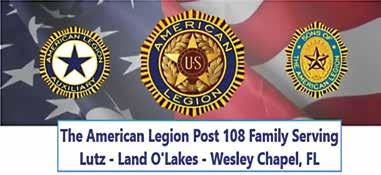
The American Legion was chartered and incorporated by Congress in 1919 as a patriotic veterans organization devoted to mutual helpfulness.
If you have served at least one day of active military duty since December 7, 1941 and were honorably discharged or you are still serving active military duty honorably, you are eligible for membership with The American Legion.
The Auxiliary and The Sons provide an opportunity for children, grandchildren and spouse of veterans to honor their family members that served our country, and keep their legacy alive for years to come.
SERVICES AND PROGRAMS:
BENEFITS CENTER
CAREER CENTER
EDUCATION CENTER
HEALTH CENTER
TROOP AND FAMILY SUPPORT
USAA FINANCIAL CENTER
WOMEN VETERANS
BASEBALL
BOY STATE/NATION
NATIONAL EMERGENCY FUND OPERATION COMFORT WARRIORS
ORATORICAL CONTEST
SCHOLARSHIPS
MEMBER DISCOUNTS
E-NEWSLETTER PUBLICATIONS CAREERS
Join Veterans and our families
4th Monday of each month
5pm Auxiliary • 6pm Sons • 7pm Legion
Plantation Palms
23253 Plantation Palms Blvd.
Land O’ Lakes, FL 34639
www.americanlegionpost108.org
FireWatch magazine will highlight local businesses supporting our area’s veteran community each month. Scan the QR code to learn more about each of the Team FireWatch classified advertisers.


Serving the entire Tampa Bay area. Veteran family-owned. Crematory on premises. We help you with all VA claims. Clearwater (727) 524-9202.
Category - Financial Services
High-quality financial products through A-rated companies. Life Insurance/ Annuities. (813) 997-1947 info@iamsarab.com
ACKERMAN FAMILY ENTERPRISES
handles all your home inspection needs in the Tampa Bay area with a 10% discount on your home inspection. (813) 750-3644 jackerman@hometeam.com
Secure Your Shelter & Future
Keller Williams Realty New
Tampa. Be a Real Estate professional today! FREE licensing prep course Josh Porthouse (352) 978-2265
LUTZ CEMETERY
Rest with Dignity and Honor Managed by The American Legion 108 Lutz Seeking Applications for Legion
HONOR GUARD Contact Bob 908.655.7927
With the cost of beef soaring ridiculously higher by the day, eating a great steak at home is becoming a luxury. So, suppose you are “investing” in a prime ribeye, or any other of your favorite cuts, for that special occasion. In that case, it makes sense to prepare it perfectly. You do not have to be a gourmet chef to prepare a steak as good as any in those high-priced steakhouses. Also, you don’t need to use an expensive rib eye or filet mignon to enjoy a well-prepared streak that tastes great and doesn’t break the bank. I’ll have a list of cuts included on the online recipe page. Here are the simple preparation steps to impress your dinner guests and elevate your status as a culinary master. To be successful every time, you will need to do a bit of preplanning. Let’s start with three things you absolutely must have to be successful. I have included links to the online version of the recipe (scan the QR code to link to the full article).
1.) A cast iron skillet
2.) A meat thermometer
3.) A 16x12x1 wire baking sheet rack.
The process is the same whether using a stove/oven or outdoor grill to prepare your steak.
First, we must prepare the star of the show for the performance. This begins 24 hours in advance of cooking. The steak must be salted and refrigerated for at least 4 hours, but 24 hours is ideal. This is done because we want to seal all the natural juices inside the meat. This method is the best way to do that. Salting the meat and putting it on a wire rack in the refrigerator for 4 to 24 hours will allow the salt to interact with it and seal the juices inside the meat, making for a moist, delicious steak, regardless of the finished doneness. Please don’t skip this step. NEVER, NEVER, NEVER, EVER salt the beef immediately before putting it on a hot surface. This will draw the moisture from the meat, causing it to be dry
Continued Online. Scan the QR code to access the article.


Sponsored by



VENDORS • FRESH PRODUCE • LOCAL ARTISTS
ARBORIST PRESENTATION • GRAFTING DEMONSTRATIONS FRUIT TREES & MORE!




